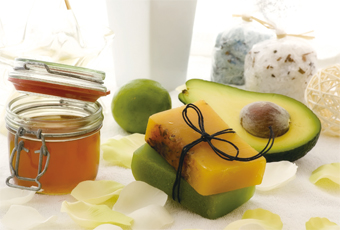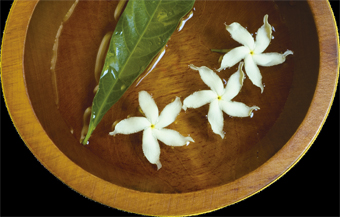We can relieve stress and lighten our mood naturally through our sense of taste, touch and smell

OWING to our lifestyles, we often find our muscles feeling tighter, our tempers fraying, and our skin, hair and nails showing the effects of this tension. Stress can be caused both externally and internally. Exposure to toxins and polluted environments can affect our moods as much as a bad day at the office can. A poor diet and imbalances in our body's biochemicals can wreak havoc on how we feel and how much energy we have to get on with our day - and night. There are many ways that we can reduce the effects of being bombarded by these stressors: through what we ingest, what we touch and what we smell.
A Natural High Biochemicals and hormones in our brains and bodies help to regulate our moods and how we deal with stress. Once such biochemical is the neurotransmitter, serotonin, which is believed by many researchers to influence our moods and also enhance our ability to relax. Hormones responsible for an opposite but just as important effect, catecholamines, are released during times of physical or emotional stress and help keep us alert and focused. Lack of sleep, stimulants, alcohol and over-processed foods can deplete these natural mood enhancers. Fortunately, in humans, both serotonin and catecholamines are affected by diet since both are derived from amino acids that can be easily obtained in certain foods. Serotonin is biochemically derived from tryptophan, whilst catecholamines are derived from tyrosine; these amino acids are present in specific, everyday foods that can be easily ingested to help us deal with exhaustion, depression and general lack of energy. Including foods and beverages high in tryptophan and tyrosine - especially if they are organic and natural sources - will support your body's production of serotonin and catecholamines. Tryptophan is particularly plentiful in chocolate, oats, dried dates, milk, yoghurt, cottage cheese, red meat, eggs, fish, poultry, sesame, chickpeas, sunflower seeds, pumpkin seeds, spirulina, and peanuts. Meat, dairy, eggs as well as almonds, avocados and bananas are good sources of tyrosine. Apart from dietary means to improve our moods and help us relax, we can use other sensate "treatments" like indulging in baths with stress-relieving oils and scents.
Top 5 Essential Oils for Stress Relief Stretching back to the beginning of time, essential oils have been used for stress relief. Yet, as time has progressed so have people's stress levels. Along with our technologically advanced society, come more severe challenges that cause stress and anxiety. After you've had a long day filled with the pressures of life on the job, life with in-laws or just life in general, using essential oils for stress relief will lead you down a quick path to relaxation. Essential oils are a popular and effective choice for stress relief for many reasons: - All natural with no harmful side effects - Quick acting - Many methods of use: diffused, massaged, added to skin care products or a bath soak Here are the only oils you'll ever need for quick relief from stress, according wellness writer Michelle H. Smith who specialises in stress and anxiety reduction. Chamomile. Chamomile oil (both Roman and German) has powerfully calming properties that can also be used to treat PMS and other "female" problems.

Chamomile is even recommended by health practitioners to calm irritable children and colicky infants. It can be blended in massage oil or a few drops can be placed in a bath, vaporiser or diffuser. Chamomile is also effective for stress relief when combined with creams or lotions. Jasmine is pricier than most other essential oils, but it is deserving of its price. The powerful therapeutic properties of jasmine make it precious oil.
Air Max Hyperposite OWING to our lifestyles, we often find our muscles feeling tighter, our tempers fraying, and our skin, hair and nails showing the effects of this tension. Stress can be caused both externally and internally. Exposure to toxins and polluted environments can affect our moods as much as a bad day at the office can. A poor diet and imbalances in our body's biochemicals can wreak havoc on how we feel and how much energy we have to get on with our day - and night. There are many ways that we can reduce the effects of being bombarded by these stressors: through what we ingest, what we touch and what we smell. A Natural High Biochemicals and hormones in our brains and bodies help to regulate our moods and how we deal with stress. Once such biochemical is the neurotransmitter, serotonin, which is believed by many researchers to influence our moods and also enhance our ability to relax. Hormones responsible for an opposite but just as important effect, catecholamines, are released during times of physical or emotional stress and help keep us alert and focused. Lack of sleep, stimulants, alcohol and over-processed foods can deplete these natural mood enhancers. Fortunately, in humans, both serotonin and catecholamines are affected by diet since both are derived from amino acids that can be easily obtained in certain foods. Serotonin is biochemically derived from tryptophan, whilst catecholamines are derived from tyrosine; these amino acids are present in specific, everyday foods that can be easily ingested to help us deal with exhaustion, depression and general lack of energy. Including foods and beverages high in tryptophan and tyrosine - especially if they are organic and natural sources - will support your body's production of serotonin and catecholamines. Tryptophan is particularly plentiful in chocolate, oats, dried dates, milk, yoghurt, cottage cheese, red meat, eggs, fish, poultry, sesame, chickpeas, sunflower seeds, pumpkin seeds, spirulina, and peanuts. Meat, dairy, eggs as well as almonds, avocados and bananas are good sources of tyrosine. Apart from dietary means to improve our moods and help us relax, we can use other sensate "treatments" like indulging in baths with stress-relieving oils and scents. Top 5 Essential Oils for Stress Relief Stretching back to the beginning of time, essential oils have been used for stress relief. Yet, as time has progressed so have people's stress levels. Along with our technologically advanced society, come more severe challenges that cause stress and anxiety. After you've had a long day filled with the pressures of life on the job, life with in-laws or just life in general, using essential oils for stress relief will lead you down a quick path to relaxation. Essential oils are a popular and effective choice for stress relief for many reasons: - All natural with no harmful side effects - Quick acting - Many methods of use: diffused, massaged, added to skin care products or a bath soak Here are the only oils you'll ever need for quick relief from stress, according wellness writer Michelle H. Smith who specialises in stress and anxiety reduction. Chamomile. Chamomile oil (both Roman and German) has powerfully calming properties that can also be used to treat PMS and other "female" problems.
OWING to our lifestyles, we often find our muscles feeling tighter, our tempers fraying, and our skin, hair and nails showing the effects of this tension. Stress can be caused both externally and internally. Exposure to toxins and polluted environments can affect our moods as much as a bad day at the office can. A poor diet and imbalances in our body's biochemicals can wreak havoc on how we feel and how much energy we have to get on with our day - and night. There are many ways that we can reduce the effects of being bombarded by these stressors: through what we ingest, what we touch and what we smell. A Natural High Biochemicals and hormones in our brains and bodies help to regulate our moods and how we deal with stress. Once such biochemical is the neurotransmitter, serotonin, which is believed by many researchers to influence our moods and also enhance our ability to relax. Hormones responsible for an opposite but just as important effect, catecholamines, are released during times of physical or emotional stress and help keep us alert and focused. Lack of sleep, stimulants, alcohol and over-processed foods can deplete these natural mood enhancers. Fortunately, in humans, both serotonin and catecholamines are affected by diet since both are derived from amino acids that can be easily obtained in certain foods. Serotonin is biochemically derived from tryptophan, whilst catecholamines are derived from tyrosine; these amino acids are present in specific, everyday foods that can be easily ingested to help us deal with exhaustion, depression and general lack of energy. Including foods and beverages high in tryptophan and tyrosine - especially if they are organic and natural sources - will support your body's production of serotonin and catecholamines. Tryptophan is particularly plentiful in chocolate, oats, dried dates, milk, yoghurt, cottage cheese, red meat, eggs, fish, poultry, sesame, chickpeas, sunflower seeds, pumpkin seeds, spirulina, and peanuts. Meat, dairy, eggs as well as almonds, avocados and bananas are good sources of tyrosine. Apart from dietary means to improve our moods and help us relax, we can use other sensate "treatments" like indulging in baths with stress-relieving oils and scents. Top 5 Essential Oils for Stress Relief Stretching back to the beginning of time, essential oils have been used for stress relief. Yet, as time has progressed so have people's stress levels. Along with our technologically advanced society, come more severe challenges that cause stress and anxiety. After you've had a long day filled with the pressures of life on the job, life with in-laws or just life in general, using essential oils for stress relief will lead you down a quick path to relaxation. Essential oils are a popular and effective choice for stress relief for many reasons: - All natural with no harmful side effects - Quick acting - Many methods of use: diffused, massaged, added to skin care products or a bath soak Here are the only oils you'll ever need for quick relief from stress, according wellness writer Michelle H. Smith who specialises in stress and anxiety reduction. Chamomile. Chamomile oil (both Roman and German) has powerfully calming properties that can also be used to treat PMS and other "female" problems.  Chamomile is even recommended by health practitioners to calm irritable children and colicky infants. It can be blended in massage oil or a few drops can be placed in a bath, vaporiser or diffuser. Chamomile is also effective for stress relief when combined with creams or lotions. Jasmine is pricier than most other essential oils, but it is deserving of its price. The powerful therapeutic properties of jasmine make it precious oil.Air Max Hyperposite
Chamomile is even recommended by health practitioners to calm irritable children and colicky infants. It can be blended in massage oil or a few drops can be placed in a bath, vaporiser or diffuser. Chamomile is also effective for stress relief when combined with creams or lotions. Jasmine is pricier than most other essential oils, but it is deserving of its price. The powerful therapeutic properties of jasmine make it precious oil.Air Max Hyperposite
 iConnectHub
iConnectHub
 Login/Register
Login/Register Supplier Login
Supplier Login


























